Home Care Aides Stage Hunger Strike, Demanding Ban on 24-Hour Shifts
In the latest step of a yearslong fight, home care aides staged a hunger strike, calling on City Council to pass a bill that would abolish 24-hour shifts in their industry.
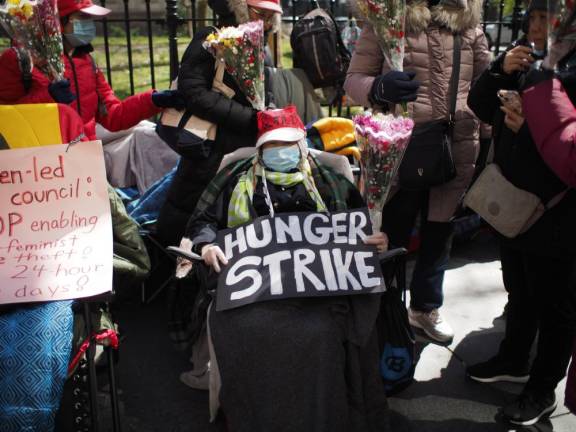
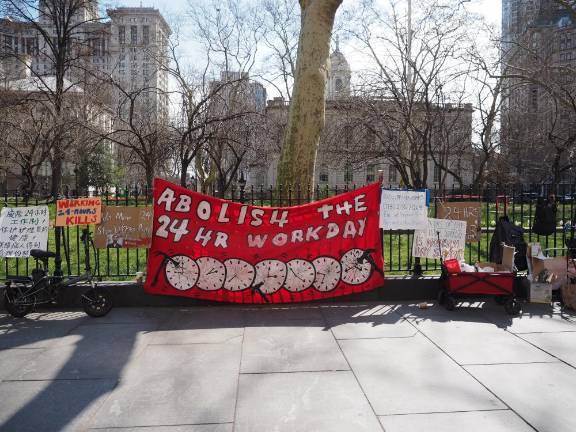
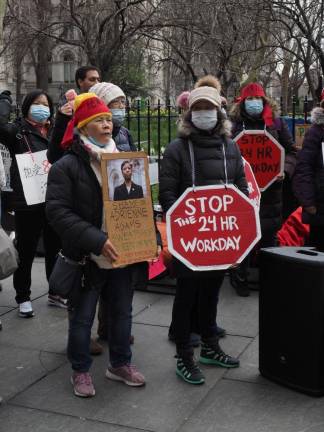
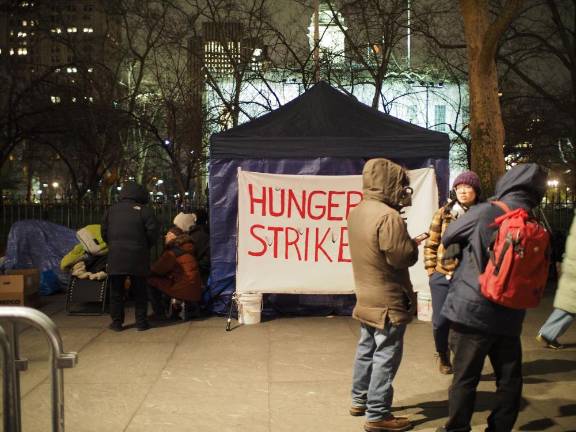
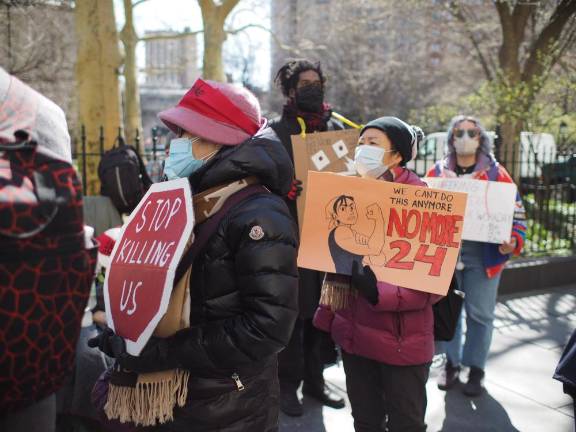
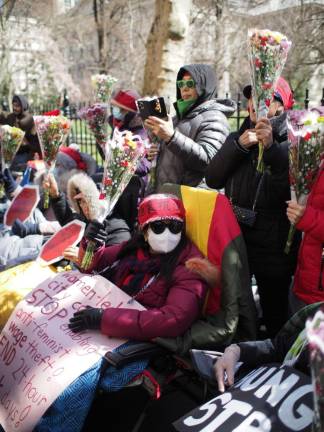
On March 20, 24 home care aides and labor advocates camped out in front of City Hall and launched a six-day hunger strike — the latest demonstration in a yearslong fight to end the 24-hour shift. Their target was to get the No More 24 Act, a city council bill, to a vote. If passed, it would cap home care aides’ shifts at 12 hours, and their workweek at 56 hours.
Under the current interpretation of New York State labor law, a home care aide can be compensated for just 13 hours of her 24-hour shift, so long as she gets 11 hours of rest: three hours of meal breaks and eight hours of sleep, five of which are interrupted. But that rarely happens in practice, the strikers say. In a patient’s private home, unsupervised by a manager, home care aides have to provide care at all hours, and it is impossible to get uninterrupted rest.
“We’re fighting to end the 24-hour shift for our own generation and the next,” said 66-year-old striker Yun Fang Hang in Mandarin Chinese. She described working four 24-hour shifts every week for nearly 12 years, caring for an elderly patient with dementia. She would cook for and feed her patient, help him in and out of bed, escort him to the bathroom, manage his medication and comfort him when he was confused. At night, she slept near his bed, but was frequently awoken by the medical alarm, which would trigger when he moved or pushed the call button.
When her patient died in 2022, Hang left the job, but it had taken its toll. “My back aches. My hands are stiff. My body has fallen apart,” she said. When she spoke to Straus News, it was her third day without food, but her voice was forceful. “Adams pushed me and the other home care aides to do this. So I couldn’t wait to go on hunger strike.”
The costs of care
Hang was referring to New York City Council Speaker Adrienne Adams, whom demonstrators have heavily criticized for failing to support the No More 24 Act. Last year, when asked about the previous version of the bill, her office stated that they prioritized New Yorkers with disabilities and “other important stakeholders” with “significant concerns.” Some have argued that ending 24-hour shifts would make it difficult to afford and schedule round-the-clock care.
Adams has since contended that the city does not have the authority to ban the 24-hour shift. “The funding and regulatory framework of home healthcare is determined by the state through Medicaid and State Department of Labor regulations and policies,” said a city council spokesperson in a statement, in response to a request for comment directed at Adams.
This year, the council speaker sponsored a resolution calling on state lawmakers to pass legislation that would reduce Medicaid payments to insurance companies and increase the minimum wage for home care workers. It did not mention the state-level equivalent to the No More 24 Act, which would amend labor law and limit the number of required working hours for home care aides.
Adams’ resolution passed on March 7. It “makes clear our position that the state should enact legislation and policy changes to ensure home care workers are appropriately paid for their work and protected,” said the council spokesperson. “Arguments ... that assert city legislation could alter state policy are either misinformed or intentionally misleading and irresponsible.”
No More 24 advocates are not moved by the council speaker’s position. Councilmember Christopher Marte, the bill’s sponsor, has maintained that the city does have the legal authority to end the 24-hour shift, a claim echoed by the strike’s organizers and the advocacy group Public Citizen.
Home care agencies and insurance companies have vigorously opposed the bill, arguing that its passage would make their services untenable. Paying aides for just 13 hours of their 24-hour shifts keeps costs down for home care agencies, insurance providers, and the state Medicaid system, which funds most home care programs. The state labor department has previously described the practice as “needed to preserve the status quo, prevent the collapse of the home care industry, and avoid institutionalizing patients who could be cared for at home.”
The status quo is costing home care aides their health, their happiness, and sometimes, their lives, demonstrators say. “We have lost a lot of our sisters because they died from overworking,” said Yolanda Zhang, an organizer with Ain’t I A Woman?!, a campaign to end the 24-hour shift. “Stop reducing this to a money issue. People’s lives are on the line.”
Above survival, dignity
On the strike’s third day, Yolanie Alvarez stood at the edge of the crowd, clutching a flyer close to her chest. She’d come across the demonstration on her lunch break, and thought, “Okay, finally. They’re doing something.” Her mother, a Honduran immigrant, was a home care aide, and so were her aunts. “They all did the 24-hour shifts,” she said. Her voice trembled. “My mom passed almost 20 years ago. ... I wish that there was something done when she was alive.”
The majority of home care workers in New York City are immigrant women of color, according to a comptroller’s report. Most of the hunger strikers were Chinese women in their 60s and 70s. “We got to New York without a place in the culture, without English. What else could we do? We had to survive,” one of them said.
Two sisters who showed up to support the strikers, Liang Jia Xin and Leong Ka Lai, have both worked as home care aides. Liang described forgoing meals during her shifts because her patients’ families did not allow her to cook her own meals. Leong described sleeping on a row of chairs with only newspaper as padding, because that was all her patient’s family would provide.
Their stories underscored a point repeated throughout the strike: the 24-hour shift requires care workers to not only sacrifice their wages and health, but also their dignity.
The work continues
The strike ended with a rally on March 26. 21 strikers had made it through the six days. The mood was celebratory: over a hundred supporters had turned up, chanting and applauding as organizers delivered speeches.
Councilmember Marte was in the crowd. Though he hadn’t heard from Speaker Adams, he said, he knew she was aware of the hunger strike. He urged her to support the bill. “If we are the most progressive city council, then this should be a given that no one should be working 24 hours, right? It’s not even a conservative issue, it’s not a progressive issue — it’s a moral issue. And if you can make the most vulnerable population do this, then you can allow anyone to work 24 hours,” he said.
As the rally died down, 68-year-old striker Yayun Li sat quietly in a camping chair. She held a bouquet of pink chrysanthemums in one hand, and a sign that read “hunger strike” in the other. Like the other demonstrators, she was going to go home and rest, she said in Mandarin Chinese. “And then we’ll keep on fighting.”